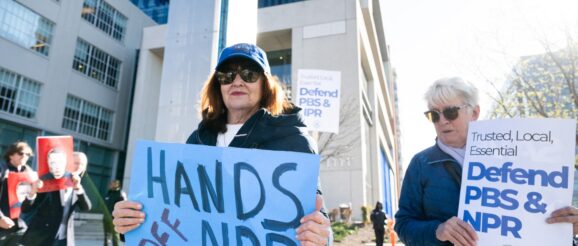Senators question Trump plan to kill funds for PBS, and some foreign aid

Democrats and Republicans on the Senate Appropriations Committee pushed back against the Trump administration’s bid to kill federal funding that Congress already has approved for public broadcasting and international aid programs.
In President Trump’s request to Congress, sent last month, he justified the cuts because the targeted foreign aid programs were “antithetical to American interests,” and because “[f]ederal spending on [the Corporation for Public Broadcasting] subsidizes a public media system that is politically biased and is an unnecessary expense to the taxpayer.”
In response to a later question, Office of Management and Budget Director Russell Vought testified that emergency broadcasting services funded by CPB would be safe. He also argued that because the CPB rescission doesn’t apply to the current fiscal year, local stations would have “ample time to adjust” and “they should be more judicious” about who they pay for content.
Upon further questioning by Alaska Republican Lisa Murkowski, who has come out against the public broadcasting cuts, Vought committed to working with her on funding for rural stations. Yet he reiterated that Republicans have spent years trying to address public funding of content.
The vast majority of the $9.4 billion in cuts requested by the White House are to foreign aid programs addressing global public health, international disaster assistance and hunger relief.
On Wednesday, Sen. Patty Murray of Washington, the panel’s top Democrat, questioned the legality of the White House’s request. Under the 1974 Impoundment Control Act, both chambers of Congress must approve such a request by a simple majority within 45 days of its submission—in this case, by July 18.
The cuts to CPB would “rip away funding that supports over 1500 local public TV and radio stations,” Murray said.
“Rural communities will be the hardest hit, not to mention our kids,” she said, adding that the cuts threaten “free, high-quality programming that is thoughtfully developed to get our kids thinking and to grow their curiosity.”
In one exchange between Vought and Murray, the senator said that public broadcasting and the global HIV/AIDS program known as PEPFAR, an initiative begun in 2003 by President George W. Bush, have both enjoyed bipartisan support in the past.
“Do you believe Congress has been wrong all these years to support them?” she asked.
“I think what’s changed is the nature of how these programs are being implemented,” Vought replied. “While I respect that they once had bipartisan backing, the facts we’ve uncovered show funding being diverted to advocacy and social engineering projects that I don’t believe reflect the values of the American taxpayer. We’re not against medical aid—we’re against the misuse of funds under misleading labels.”
With Democrats united against the bill, the White House can afford to lose no more than three Republican votes. Yet, several Republicans on the committee voiced doubts about the choice before them.
Kentucky Republican Sen. Mitch McConnell voiced concern over cutting foreign aid programs. He noted that “at a very low cost” the U.S. had “built some pretty good relationships, particularly in countries in the Middle East that certainly wouldn’t be described as democratic.”
“Reforming the way we invest in peace and stability is certainly worthwhile. And there’s plenty of absolute nonsense masquerading as American aid that shouldn’t receive another bit of taxpayer funding,” he said. “But the administration’s attempt to root it out has been unnecessarily chaotic. In critical corners of the globe, instead of creating efficiencies, you’ve created vacuums for adversaries like China to fill.”
